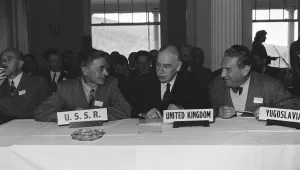International Security is America's leading peer-reviewed journal of security affairs.
This policy brief is based on "Grounds for War: The Evolution of Territorial Conflict" which appears in the winter 2013/14 issue of International Security.
Bottom Lines
- Territory Dominates Past and Present Conflict. Throughout history, and as reflected in today's most sensitive flash points—such as Jerusalem, Kashmir, the South China Sea—most wars have centered on the conquest, defense, or control of territory. Conflict over territory is unsurprising when it contains material or strategic resources. However, the pervasiveness and severity of territorial aggression remains puzzling, particularly when actors fight over land devoid of material or strategic value.
- Recurrent Patterns of Territoriality in Nature. Territorial behavior—territoriality—is not unique to humans. It is widespread across the animal kingdom, and scientific research reveals recurrent behavioral patterns that transcend species and context, notably: (1) territorial incumbents tend to win, even against stronger opponents; (2) aggression tends to be the dominant strategy, even when fighting is costly; and (3) territorial behavior varies with the degree of harm combatants can inflict, the value attached to a territory, and the costs of finding alternative territory.
- New Insights for Conflict Resolution. This wider evolutionary framework suggests why people may be willing to fight over territory even when the costs are high and the probability of success is low, outlines conditions under which territorial aggression is more or less likely, and suggests new ways to avoid it.
Territory Dominates Past and Present Conflict
Throughout history, the defense of or desire for territory has led to recurrent and severe conflict. States are prepared to fight, and individuals to die, even over land with little intrinsic value. Depending on the method of measurement, statistical studies show that territorial disputes account for one-quarter to three-quarters of all wars. Moreover, explicitly territorial disputes are more likely to lead to war than other types of dispute, more likely to lead to recurrent conflict, and more likely to result in high fatalities if war occurs. Areas regarded as "homeland" are particularly volatile and violently contested. When territory holds resources or offers a strategic location, conflict can be perfectly rational. In many territorial conflicts, however, material benefits are absent, and even where they are present, the sensitivity and severity of conflict are so great that territorial aggression poses a significant puzzle in search of an explanation, and an important problem in search of policy innovations.
Recurrent Patterns of Territoriality in Nature
Territorial behavior is puzzling only if we ignore the context in which it has evolved. From an evolutionary perspective, territoriality is not puzzling, and in fact shows recurrent patterns and common strategies that transcend species and context. Territorial behavior is prevalent not only among humans, but across the animal kingdom. It has evolved independently across a broad array of taxonomic groups and ecological contexts, from the depths of the ocean to rainforest canopies, and from arid deserts to the Arctic tundra. This recurrence of territorial behavior suggests evolutionary "convergence" on a tried and tested solution to a common strategic problem—an efficient way to secure access to key resources. Organisms have thus tended to develop territoriality because it is an effective strategy for survival and reproduction.
A long tradition of research in evolutionary biology has used game theory and fieldwork to explore which strategies tend do well in conflict over territory. The results are consistent and striking. Behaving aggressively over territory—playing "hawk"—is the best strategy wherever the prize at stake exceeds the costs of conflict. Hawk is an "evolutionary stable strategy"—it cannot be trumped by any other. More remarkably, however, even when the costs of conflict exceed the prize, hawk still emerges as the dominant strategy under certain conditions (such as the presence of transfer costs or combat advantages for territory incumbents). Evolutionary game theory thus suggests that territorial aggression is a strategy that one should expect to have evolved even if, or rather precisely because, fighting is costly.
Evolutionary logic suggests that territorial aggression can be an effective long-term strategy, even when it incurs short-term costs, but only if the level of aggression is correctly calibrated to the prevailing environment. The problem with evolved traits (as with food preferences or addictive behaviors) is that they tend to be calibrated to cost-benefit ratios that prevailed in humans' evolutionary past, not those of the present. Beneficial traits can therefore become detrimental in the modern environment. If human territoriality is influenced—even partially—by evolved behavioral mechanisms, then territorial aggression may today be triggered to some extent irrespective of the value of the land, the costs of conflict, or the probability of victory.
While hawkish strategies are likely to predominate, especially among territorial incumbents, evolutionary game theory also outlines conditions under which such strategies will be more or less common. Three important conditions preserve territorial equilibrium (e.g., where ownership is not challenged and conflict is avoided): (1) combatants can cause great harm; (2) the costs of finding alternative territory are high; and (3) the benefits at stake are not too valuable. The so-called territorial integrity norm after World War II reflects a change in these conditions. The world before 1939 had the ingredients for territorial conflict, at least for the great powers: offensive advantages, unclaimed territory, and valuable resources to be seized. After 1945 the world was characterized by the opposite conditions: defensive advantages (especially given the presence of nuclear weapons); the partitioning of the globe into self-determined territories; and resources that could no longer be easily seized, held, or exploited. Territorial conquest may have paid in the past, but it is increasingly expensive today. Defenders can ultimately benefit from adopting or maintaining the hawk strategy even if they incur significant costs in the process, as the Vietcong and Taliban can attest.
New Insights for Conflict Resolution
Although an evolutionary perspective suggests that humans have a low threshold for territorial aggression, it is not a fixed response. Territorial behavior varies, and in predictable ways. Like other biological traits, territorial behavior is partially contingent on circumstances, taking advantage of strategic opportunities and avoiding dangers. These changes in circumstances, however, may be perceived rather than real—behavior will change either way. This means that shaping perceptions can be the key to conflict resolution in territorial disputes.
First, perceptions can directly upset the conditions for territorial equilibrium. For example, aggression will increase if actors underestimate the costs of conflict, feel cornered or see alternatives as worse, or see territory as having exclusive ethnic, cultural, or religious precedence. All such perceptions can, in principle, be shaped and altered to help prevent or resolve conflict.
Second, if both sides perceive themselves to be the territorial incumbent—a common phenomenon among historical enemies—the problem looms large because each side may expect to win and expect the other side to back down, despite asymmetries in size and strength. This has been strikingly demonstrated by experiments with animals: when two animals are tricked into believing a particular territory belongs to them, they may fight to the death where normally one would withdraw before sustaining significant injury. Claims to land by more than one group are likely to lead to bloody and prolonged conflict, especially if both perceive it as homeland, or as sacred. In such settings, the hawk-dove logic (a system that in equilibrium reduces the incidence of fighting) breaks down and conflict can escalate despite rising costs, declining benefits, and likely defeat. This "perfect storm" of mutually perceived incumbency and hawkish strategies helps to explain why rivalries over such territories as the West Bank and Northern Ireland have been so enduring and hard to resolve. There are, however, grounds for hope. Given that perceptions and misperceptions can be the cause of incompatible claims, changing perceptions—as well as or instead of facts on the ground—offers a genuine route to conflict resolution.
Conclusion
In the future, territorial conflict is likely to become more important, as populations grow and resources decline, and as territorial disputes expand into new domains, such as the polar regions, outer space and near-Earth orbits, radio frequency bands, the internet, and the commercial control of land. To avoid war and to enable other positive effects to follow, resolving conflicts is critical. Should territorial issues be resolved, studies have found that demilitarization and democratization are more likely to ensue. States will have a better chance of achieving these goals if they step back and recognize the broader patterns of territoriality in nature, of which humans are just one particularly deadly example.
Related Resources
Gintis, Herb. "The Evolution of Private Property," Journal of Economic Behavior and Organization, Vol. 64, No. 1 (September 2007), pp. 1–16.
Pearce, Fred. The Landgrabbers: The New Fight over Who Owns the Earth (Boston: Beacon, 2012).
Smith, John Maynard. Evolution and the Theory of Games (Cambridge: Cambridge University Press, 1982).
Toft, Monica Duffy. The Geography of Ethnic Violence (Princeton, N.J.: Princeton University Press, 2003).
Vasquez, John A. and Marie T. Henehan. Territory, War, and Peace (New York: Routledge, 2010).
Dominic Johnson is Alistair Buchan Professor of International Relations at Oxford University and Fellow of St. Antony's College.
Monica Duffy Toft is Professor of Government and Public Policy at the Blavatnik School of Government at Oxford University and Fellow of Brasenose College.
International Security is America’s leading peer-reviewed journal of security affairs. It provides sophisticated analyses of contemporary, theoretical, and historical security issues.
International Security is edited at Harvard Kennedy School’s Belfer Center for Science and International Affairs and is published by The MIT Press.
For more information about this publication, please contact the International Security publications coordinator at 617-495-1914.
Statements and views expressed in this policy brief are solely those of the authors and do not imply endorsement by Harvard University, the Harvard Kennedy School, or the Belfer Center for Science and International Affairs.
Johnson, Dominic D.P. and Monica Duffy Toft. “Grounds for Hope: The Evolutionary Science behind Territorial Conflict.” March 2014





